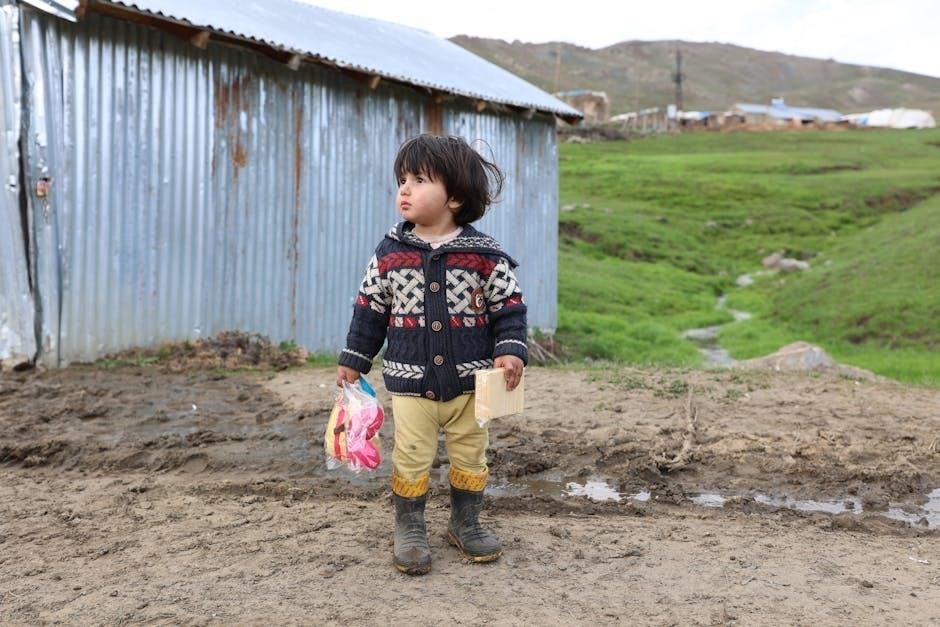This section introduces the 3rd edition of Human Development: A Cultural Approach‚ focusing on lifespan development through a cultural lens‚ emphasizing diversity and its impact on growth.
Overview of the 3rd Edition
The 3rd edition of Human Development: A Cultural Approach‚ authored by Jeffrey Jensen Arnett and Lene Arnett Jensen‚ offers a comprehensive exploration of human development through a cultural lens. Published in 2018‚ this 768-page textbook emphasizes the significance of cultural diversity in shaping developmental processes across the lifespan. It integrates cutting-edge research‚ real-world examples‚ and a global perspective to provide a holistic understanding of how culture influences growth‚ cognition‚ and behavior. The edition is available in hardcover and as an eBook‚ making it accessible for students and researchers. The text is renowned for its balanced approach‚ blending theoretical insights with practical applications‚ and is widely used in academic settings. This edition reflects the authors’ commitment to addressing the complexities of development in a multicultural world‚ ensuring relevance for contemporary studies in psychology‚ education‚ and sociology.
Importance of Cultural Context in Development
Cultural context plays a pivotal role in shaping human development‚ as it influences values‚ practices‚ and interactions across the lifespan. Understanding development through a cultural lens reveals how societal norms‚ beliefs‚ and traditions mold individual growth. Culture determines parenting styles‚ education systems‚ and social expectations‚ all of which impact cognitive‚ emotional‚ and social development. By examining cultural contexts‚ researchers can identify universal patterns and unique variations in human development. This approach fosters empathy and appreciation for diversity‚ essential in multicultural societies. The 3rd edition of Human Development: A Cultural Approach emphasizes the need to consider cultural influences when studying development‚ ensuring a more inclusive and accurate understanding of human growth across different populations and environments. This perspective is vital for developing effective interventions and policies that respect and address the needs of diverse individuals.

Theoretical Foundations of Human Development
Human Development: A Cultural Approach‚ 3rd Edition explores key theories‚ integrating cognitive‚ social‚ and emotional development within cultural contexts‚ providing a comprehensive framework for understanding growth across the lifespan.

The Cultural Approach: Key Concepts
The cultural approach in Human Development: A Cultural Approach‚ 3rd Edition emphasizes the role of culture in shaping developmental processes across the lifespan. It explores how cultural beliefs‚ practices‚ and values influence human growth‚ from infancy to adulthood. Key concepts include the idea that development is not universal but varies significantly across cultures. The text highlights the importance of understanding cultural diversity in areas such as socialization‚ language‚ education‚ and religion. By integrating theories of cultural psychology‚ the approach provides a framework for analyzing how individuals develop within their unique cultural contexts. This perspective challenges the notion of a one-size-fits-all model of development‚ instead advocating for a nuanced understanding of human growth that respects cultural differences. ISBN-10: 0-13-464134-8‚ published in 2018‚ this edition is a comprehensive resource for students and researchers alike.
Lifespan Development: A Comprehensive Perspective

Human Development: A Cultural Approach‚ 3rd Edition offers a lifespan perspective‚ examining development from infancy through aging within diverse cultural contexts. This approach underscores the continuity and change across stages‚ highlighting how cultural practices shape developmental milestones. The text explores how infancy and toddlerhood are influenced by caregiving styles‚ while childhood and adolescence focus on social and cognitive growth. Adulthood is marked by transitions and responsibilities‚ and aging is viewed through cultural lenses that define later life’s meaning. By integrating research and real-world examples‚ the book provides a holistic understanding of human development‚ emphasizing the interplay between biology‚ psychology‚ and culture. This comprehensive perspective‚ co-authored by Jeffrey Jensen Arnett and Lene Arnett Jensen‚ is a valuable resource for understanding the complexities of growth across the lifespan. ISBN-10: 0-13-464134-8‚ published in 2018‚ it remains a key text in the field.
Nature vs. Nurture: The Role of Culture
The debate between nature (genetic factors) and nurture (environmental influences) is central to understanding human development. However‚ Human Development: A Cultural Approach‚ 3rd Edition emphasizes how culture shapes this interplay. Culture influences both genetic expression and environmental interactions‚ creating a unique blend that defines developmental outcomes. For instance‚ cultural practices‚ such as parenting styles and societal values‚ shape how genetic predispositions manifest. The book highlights that culture is not just an external factor but an integral part of the nature-nurture dynamic‚ influencing cognition‚ emotion‚ and behavior across the lifespan. By examining diverse cultural contexts‚ the text illustrates how developmental processes are universally shared yet uniquely expressed. This perspective challenges the traditional nature-nurture dichotomy‚ offering a more holistic view of human growth. ISBN-10: 0-13-464134-8‚ this edition provides a nuanced exploration of culture’s role in shaping development.

Developmental Stages Across the Lifespan
Human Development: A Cultural Approach‚ 3rd Edition explores lifespan development‚ from infancy to aging‚ highlighting cultural influences on physical‚ cognitive‚ and social growth across diverse societies.

Infancy and Toddlerhood: Cultural Influences

Cultural practices significantly shape development during infancy and toddlerhood‚ influencing caregiving styles‚ social interactions‚ and cognitive growth. In Human Development: A Cultural Approach‚ 3rd Edition‚ Arnett and Jensen explore how diverse societies foster early developmental milestones. For instance‚ co-sleeping in some cultures promotes emotional closeness‚ while independent sleeping in others encourages self-reliance. Language acquisition and sensory stimulation also vary‚ reflecting cultural values. Toddlerhood sees the emergence of cultural norms‚ such as gender roles and social etiquette‚ shaped by family and community practices. These early experiences lay the foundation for lifelong cultural identity and understanding‚ highlighting the importance of a culturally sensitive approach to early childhood development.
Childhood: Social and Cognitive Development
Childhood is a critical period for social and cognitive growth‚ deeply influenced by cultural norms and practices. In Human Development: A Cultural Approach‚ 3rd Edition‚ Arnett and Jensen emphasize how societal values shape children’s interactions and learning. For example‚ some cultures prioritize collective harmony‚ fostering cooperation‚ while others emphasize individual achievement‚ promoting competitiveness. Cognitive development is also culturally mediated‚ with variations in play‚ education‚ and problem-solving strategies. Language acquisition and storytelling traditions further reflect cultural priorities‚ influencing how children process information and understand their world. These early experiences not only prepare children for their cultural context but also lay the groundwork for lifelong social and cognitive abilities‚ underscoring the importance of understanding development within a cultural framework.
Adolescence: Identity Formation and Culture
Adolescence is a formative period for identity exploration‚ deeply shaped by cultural values and practices. In Human Development: A Cultural Approach‚ 3rd Edition‚ Arnett and Jensen highlight how cultural norms influence self-concept‚ autonomy‚ and social roles. For instance‚ individualistic cultures often encourage personal expression and independence‚ while collectivist cultures emphasize family loyalty and community integration. Rituals‚ such as rites of passage‚ play a significant role in marking transitions to adulthood. Peer relationships and societal expectations also vary widely‚ impacting adolescents’ identity formation. These cultural dynamics not only shape how adolescents view themselves but also influence their future life trajectories‚ underscoring the importance of understanding adolescence within a broader cultural context.
Adulthood: Developmental Tasks and Transitions

Adulthood is marked by significant developmental tasks and transitions‚ shaped by cultural norms and expectations. In Human Development: A Cultural Approach‚ 3rd Edition‚ Arnett and Jensen explore how adults navigate roles such as career establishment‚ family formation‚ and social responsibility. Cultural influences dictate the timing and meaning of these transitions‚ with individualistic societies often emphasizing personal achievement‚ while collectivist cultures prioritize family and community obligations. Midlife reflection and aging are also culturally framed‚ impacting how adults view their accomplishments and future goals. These transitions vary widely across cultures‚ highlighting the importance of understanding adulthood within a global context to address challenges like work-life balance and societal expectations.
Aging: Cultural Perspectives on Later Life
Aging is a universal human experience‚ yet cultural perspectives significantly shape how societies view and treat older adults. In Human Development: A Cultural Approach‚ 3rd Edition‚ the authors highlight how different cultures assign meaning to aging‚ influencing roles‚ responsibilities‚ and societal contributions. Individualistic cultures often emphasize independence and personal fulfillment in later life‚ while collectivist societies prioritize intergenerational relationships and elder wisdom. Cultural norms also impact healthcare‚ retirement practices‚ and end-of-life care‚ reflecting varying values placed on aging populations. Understanding these cultural differences is crucial for fostering inclusive policies and supporting aging individuals in diverse contexts‚ ensuring dignity and quality of life across the lifespan.
Cultural Influences on Development
Cultural influences profoundly shape human development‚ reflecting diverse values‚ beliefs‚ and practices across societies‚ emphasizing the role of cultural context in shaping growth and behavior.
Family and Socialization Practices
Family and socialization practices play a crucial role in shaping human development‚ reflecting cultural values and norms. The 3rd edition emphasizes how families serve as primary agents of socialization‚ transmitting cultural beliefs‚ practices‚ and values to future generations. Across cultures‚ parenting styles vary significantly‚ from authoritarian to permissive‚ influencing children’s behavior and cognitive development. Collectivist societies often prioritize family harmony‚ while individualist cultures focus on personal autonomy. These practices are deeply embedded in cultural contexts‚ shaping identity‚ moral reasoning‚ and social skills. The book highlights how cultural differences in family structures‚ such as extended vs. nuclear families‚ impact developmental outcomes. Understanding these practices is essential for addressing global challenges‚ fostering empathy‚ and promoting inclusive policies. By exploring these dynamics‚ the text provides a comprehensive view of how culture shapes human development through family and socialization practices across the lifespan.
Language and Communication Styles
Language and communication styles are fundamental to human development‚ serving as tools for expression‚ social interaction‚ and cultural transmission. The 3rd edition highlights how language varies across cultures‚ shaping cognitive development and identity. For instance‚ some languages emphasize collectivist values‚ while others focus on individualism. Nonverbal communication‚ such as gestures and facial expressions‚ also plays a significant role in conveying meaning. Cultural differences in communication styles influence how individuals navigate social relationships and interpret emotions. The book explores how language acquisition is not just a cognitive process but also a cultural one‚ reflecting societal norms and values. Understanding these variations is crucial for fostering cross-cultural understanding and addressing developmental challenges in diverse contexts. By examining language and communication through a cultural lens‚ the text provides insights into how these elements shape human development across the lifespan.
Education and Cognitive Development
Education plays a pivotal role in shaping cognitive development‚ with cultural influences determining both the content and methods of learning. The 3rd edition emphasizes how different cultures value education‚ impacting access‚ expectations‚ and outcomes. For example‚ some societies prioritize formal schooling‚ while others rely on informal‚ community-based learning. Cultural norms also shape teaching styles‚ such as the emphasis on memorization versus critical thinking. Language and communication further mediate cognitive development‚ as they are tools for conveying knowledge and ideas. The text highlights how educational systems reflect cultural values‚ influencing problem-solving skills‚ creativity‚ and academic achievement. Understanding these cultural variations is essential for developing inclusive education policies and interventions that support diverse learning needs. By examining education through a cultural lens‚ the book provides insights into how learning environments shape cognitive growth across the lifespan.
Religion and Spirituality: Impact on Development
Religion and spirituality profoundly influence human development‚ shaping values‚ beliefs‚ and behaviors across the lifespan. The 3rd edition explores how cultural religious practices and spiritual beliefs guide moral development‚ emotional regulation‚ and social interactions. Rituals‚ ceremonies‚ and teachings often provide a sense of identity and purpose‚ particularly during critical life transitions. For instance‚ religious communities may offer support systems that foster resilience and well-being. However‚ cultural differences in religious practices can also lead to variations in developmental outcomes‚ such as attitudes toward authority or views on gender roles. The text emphasizes the importance of understanding these influences to appreciate how spirituality intersects with development in diverse cultural contexts; By examining religion’s role‚ the book highlights its significance in shaping individual and collective growth across cultures and generations.
Applications and Implications
This section explores how cultural insights from the 3rd edition inform policy‚ education‚ and interventions‚ promoting culturally sensitive practices that enhance human development across diverse societies.

Policy Implications for Multicultural Societies
Understanding cultural diversity is crucial for crafting policies that promote inclusivity and equity in multicultural societies. The 3rd edition emphasizes how cultural differences shape development‚ informing policies that address systemic inequalities. By integrating cultural perspectives‚ governments can create programs that resonate with diverse populations‚ fostering social cohesion. For instance‚ education policies can incorporate culturally responsive practices‚ while healthcare systems can adopt culturally sensitive care models. Such approaches ensure that all individuals‚ regardless of background‚ have access to resources that support their development. Additionally‚ policies that promote intercultural dialogue and understanding can reduce discrimination and enhance societal harmony. The book highlights the importance of cultural competence in policymaking‚ advocating for a lifespan approach that considers the unique needs of individuals across different stages of life. This ensures that policies are not only effective but also equitable and inclusive for all members of society.
Education and Interventions: A Cultural Lens
Education and interventions are critical in fostering development‚ and a cultural lens ensures these efforts are effective and inclusive. The 3rd edition highlights the importance of cultural sensitivity in educational practices‚ emphasizing how diverse backgrounds shape learning experiences. By incorporating culturally responsive teaching methods‚ educators can create environments that resonate with all students‚ promoting academic and social growth. Interventions should consider the cultural context of individuals‚ tailoring strategies to meet their unique needs. For example‚ bilingual education programs and culturally relevant curricula can enhance engagement and outcomes. Additionally‚ community-based interventions that involve families and cultural leaders can strengthen support systems. This approach not only addresses developmental challenges but also empowers individuals to thrive within their cultural frameworks. By adopting a cultural lens‚ education and interventions become more equitable and impactful‚ fostering holistic development across the lifespan.
Future Directions in Cultural Development Research

Future research in cultural development should focus on understanding the intersection of globalization and local traditions‚ exploring how cultural practices evolve in diverse contexts. Advances in technology‚ such as AI and digital platforms‚ offer new tools for studying development across cultures. There is a growing need to address underrepresented populations and incorporate diverse methodologies to ensure inclusive research. Additionally‚ interdisciplinary collaboration between psychologists‚ anthropologists‚ and educators can provide a more comprehensive understanding of cultural influences. Longitudinal studies will be crucial for tracking developmental changes over time. By prioritizing cultural sensitivity and equity‚ future research can inform policies and interventions that support holistic development worldwide. This approach will ensure that cultural diversity is not only acknowledged but also valued in shaping human development across the lifespan.
In conclusion‚ Human Development: A Cultural Approach‚ 3rd Edition‚ offers a comprehensive exploration of development across the lifespan‚ emphasizing the profound impact of culture. By integrating theory‚ research‚ and real-world applications‚ the text highlights the diversity of human experiences and the importance of understanding cultural contexts. The book underscores the dynamic interplay between biology‚ environment‚ and culture‚ providing a nuanced perspective on growth and development. Its focus on global perspectives and multicultural societies makes it a valuable resource for students‚ researchers‚ and practitioners. The insights gained from this approach not only enhance our understanding of human development but also inform policies and interventions that promote equity and inclusivity. Ultimately‚ the text serves as a foundation for fostering cultural sensitivity and appreciation in an increasingly interconnected world.




